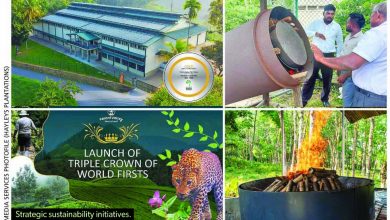SRI LANKANS OVERSEAS

Sri Lanka needs a culture of transparency and accountability
CITIZEN-CENTRIC ETHOS
Hiranthi Abeygoonesekera
Q: How do you perceive Sri Lanka today?
A: Sri Lanka has experienced immense volatility due to governance issues but the people have had the courage to overcome their problems.
Q: Do you think the country is capable of regaining its composure in the aftermath of multiple crises – including the most recent economic crisis?
A: I hope the IMF loan will help start the recovery process. The increase in taxes imposed on the people is undoubtedly hard – but I feel that with passion, a clear purpose and the commitment to change, Sri Lanka can recover from the volatility of its past.
In this context, I believe that the dogma of the past is inadequate for the stormy present. All leaders face a VUCA world – one that’s filled with volatility, uncertainty, complexity and ambiguity.
This situation will continue to exist, and crises of different types and forms will present themselves. In times of crisis, unpopular decisions must be made, and people have to face pain and suffering to overcome them.
Q: From afar, what advice would you offer Sri Lankans in the context of crisis management and finding solutions to the problems they face?
A: First and foremost, the government and its institutions must win the trust and confidence of the people. At the moment, the public appears to have very little trust in the machinery of the state.
A recent OECD report on public trust states that “trust helps countries govern on a daily basis and respond to the major challenges of today and tomorrow: the ongoing health and economic crises, the longstanding rise in inequalities, population ageing, technological advances and the existential threat of climate change.”
“Sufficiently high levels of institutional trust can help governments reduce transaction costs in governance, in society and in the economy, and help ensure buy in and compliance with public policies. Trust can help foster public investments in challenging reforms and programmes that produce better outcomes,” it adds.
To achieve this, there must be greater transparency of decisions, efficient mechanisms of accountability and an effective communication strategy. Above all else, there must be integrity and transparency, and leaders who adhere to these values.
Q: How do compatriots in your country of domicile view Sri Lanka?
A: New Zealanders who visit Sri Lanka absolutely love the island since it’s a beautiful country with a great hospitality sector and lovely people. And the fact that Sri Lankans in New Zealand have a good profile has helped sustain that positive image.
Sri Lanka must transform its machinery of governance, and gain the trust and confidence of its citizens, in the government and public service
Q: Likewise, how do other Sri Lankans living in New Zealand view Sri Lanka?
A: Sri Lankans living in New Zealand have the advantage of being able to compare the two countries and feel that Sri Lanka has a long way to go to achieve the level of governance that we see in New Zealand.
Q: What were your impressions of Sri Lanka on your last visit – and how much has it changed from the past?
A: I visited Sri Lanka in October last year, and it seemed that people had recalibrated their lifestyle expectations and were moving on.
Q: How do you view the brain drain – and why is there still no reversal of it, in your opinion?
A: Brain drain occurs when people despair about the future – especially for their children.
I don’t think there will be a reversal of it soon; at least, not until people feel they can enjoy a better quality of life than what they’re presently enjoying. Expatriates may return if they feel their skills and expertise will be valued in Sri Lanka.
Q: What should Sri Lanka focus on most in the coming decade?
A: The country should remain committed to the journey of recovery. Sri Lanka must transform its machinery of governance, and gain the trust and confidence of its citizens, in the government and public service.
Q: And what are your hopes for the country in the next decade or so?
A: I hope that Sri Lankans will take a long-term view, reflect on the past and use this crisis as the catalyst for major change.
Think afresh, act anew and move forward, working towards greater self-reliance. A citizen-centric government is critical for all Sri Lankans.











